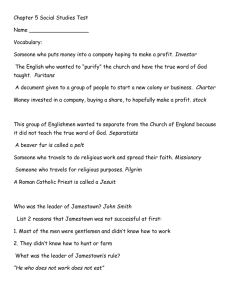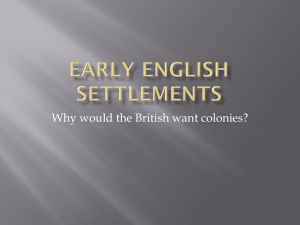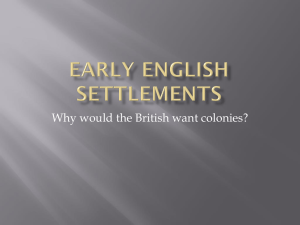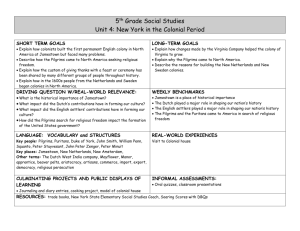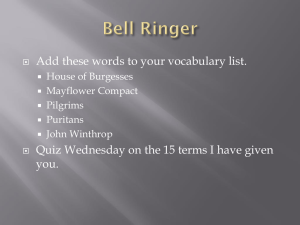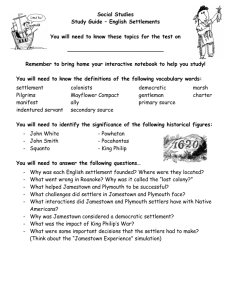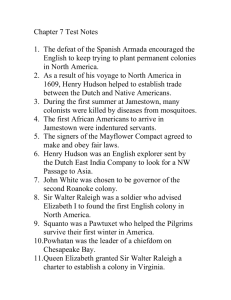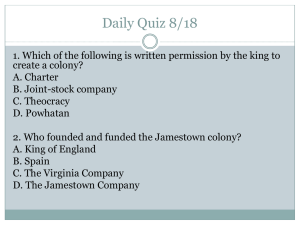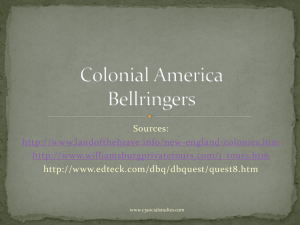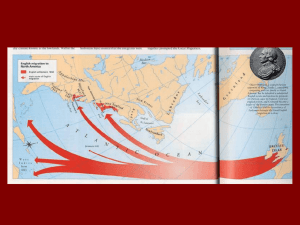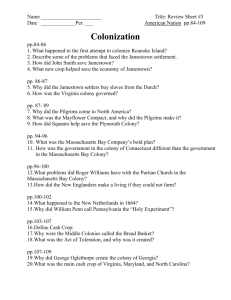Early American Colonization: Jamestown, Pilgrims & Colonies
advertisement
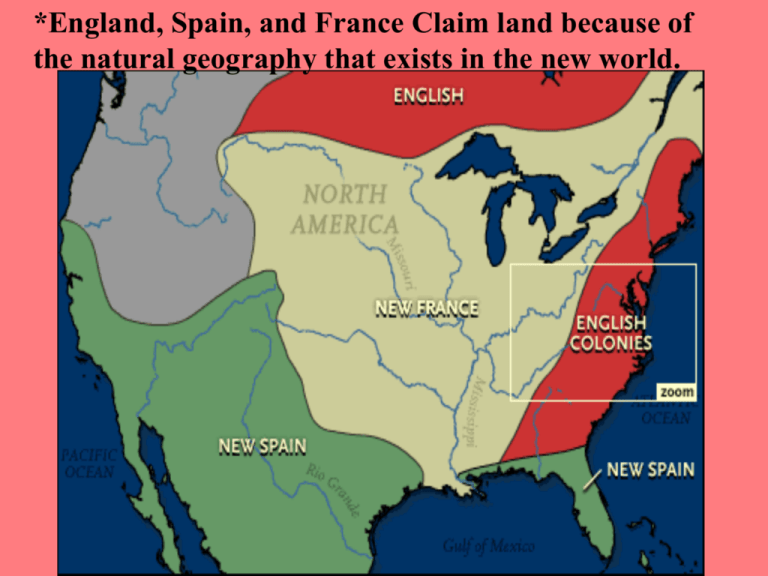
*England, Spain, and France Claim land because of the natural geography that exists in the new world. People Settling in the New World became known: GREAT CONVERGENCE or migration = The values and institutions of Europeans life took root in the colonies. MAP KEY: + The Church 1. Market Place 2. Storehouse and Court of Guard 3. Streets of "Settled" Houses (shown in rows) 4. Palisades of Posts 5. Bulwarks of Half-moon Shape 6.Principal Entrance, or "South Gate 7. Other Gates 8. Trench or Moat around Palisade 1. Jamestown was funded or paid for by a jointstock company called the Virginia Company. (1607, Jamestown is the FIRST ENGLISH Permanent settlement in America.) 2. Roanoke Settlement failed, it was the first attempt by the English, and no one knows why, never heard from the settlers again. 4. Captain John Smith saved Jamestown from certain failure like Roanoke. 5. Algonquian Indians attacked the settlement, led by Powhatan. http://www.historyglobe.com/flash.html#a1 http://www.historyglobe.com/jamestown/ Problems They Faced: *Over half of them were “gentlemen” *Diseases killed many. *Didn’t know how to grow crops well, and salt water/marshy land made it difficult. *Natives attacked. *Decided all food grown was shared equally. 7. John Smith, their leader, said if you didn’t work, you couldn’t eat. (Took care of many issues) 8. John Rolfe married Pocahontas, daughter of Powhatan, this created peace. 9. Smith returned to England in 1609, men struggled to survive, ate dogs, cats, mice, and cooked leather. 10. By 1619, Many survived, as did Jamestown, they set up a House of Burgesses, 1st law making body of men representative owning land in the new world. (Decided how much Tobacco sold for and taxes for roads.) Jamestown Home Mayflower- Ship the Pilgrims came to the new world on. Pilgrims Want religious freedom from England in 1620. Mayflower Compactagreement signed by Pilgrims to do what was best for group, helped establish idea of early democracy in America. William Bradford- Leader of Pilgrims. Squanto- Indian who helped the Pilgrims survive. (crops, trade) Comparison of the South and New England South New England Economy agriculture manufacturing Reasons for establishing a colony provide Britain with an new trade market religious freedom Population Tidewater aristocracy Puritans Social structure 3-part social structure: Aristocracy (few, wealthy) Middle class farmers Slaves People were considered relatively equal, at least in the eyes of God Label your map showing the 13 colonies http://www.socialstudiesforkids.com/graphics/13mapnew.htm Pequot Indians- Indian group that had trouble with the first New England settlers. Chief Metacomet- Leader of Pequot Indians, also called King Philip. King Philip’s War- Conflict between the Pequot and colonists, Indians were defeated. Roger Williams- Founded Rhode Island and was against strict Puritan ideas. Quakers- Radical sect of Puritans (persecuted in England and America) John Winthrop- Leader of Mass. Bay Colony. James Oglethorp- Leader of the colony of Georgia. Massachusetts Bay Colony- Settlement in New England by Puritans. New England Way- Puritans beliefs and society. Maryland- Founded by Lord Baltimore as a refuge for Catholics. New York- Founded by Dutch, claimed by Charles II and given as a gift to the Duke of York. New Jersey- Given as a gift to two other men from a chunk of New York. Pennsylvania- Given to William Penn by the Duke of York to pay off a debt. Georgia- Established as a place to send criminals. Great Awakening- Return to religious faith in the mid 1700’s. Jonathon Edwards- Leader of the Great Awakening. Plantations- Large Farms in the South. Slaves- worked for plantations for white masters. Magna Carta- Limited the King’s power in England. Petition of Right- Gave people the right not to be taxed without representation. English Bill of Rights- Gave Englishmen their basic rights. Bacon’s Rebellion- Led to more rights for Colonists. Salam Witch Trials: http://school.discovery.com/schooladventures/salemwitchtrials/story/story.html
